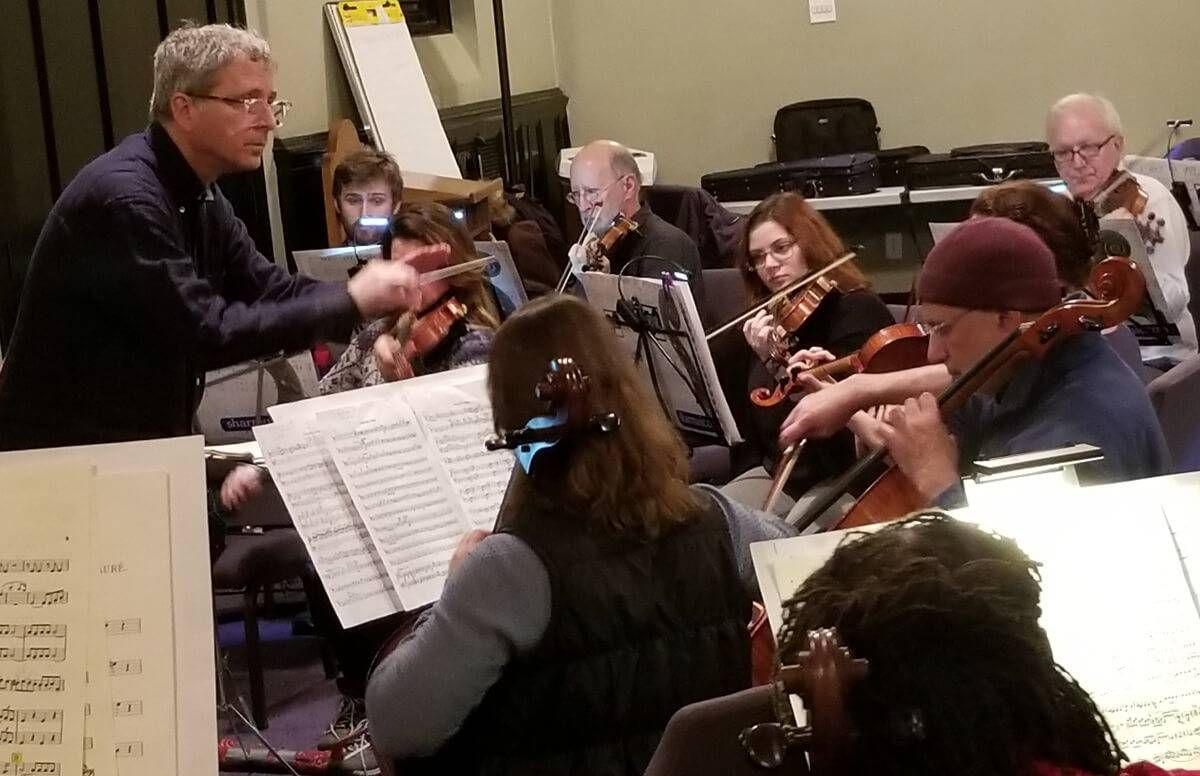The Me2/Orchestra Removes Stigmas Surrounding Mental Illness
Conductor Ronald Braunstein and musicians find joy and acceptance performing
When Ronald Braunstein takes center stage to conduct his orchestra, there’s no sign of his bipolar disorder. He’s self-assured and happy. It wasn’t always that way for the 63-year-old.

After graduating from Julliard in his early 20s, Braunstein entered a summer program at the Salzburg Mozarteum in Austria, and became the first American to win the prestigious Karajan International Conducting Competition in Berlin. At 23, he beat out 600 applicants from around the world.
Following his win, Braunstein’s career took off. He worked with orchestras in Europe, Israel, Japan and Australia. At the time, he didn’t have a diagnosis.
Looking back, he credits the competition win to his bipolar disorder. “I learned repertoire fast. I studied through the night and wouldn’t sleep. I didn’t eat because if I did, it would take away my edge,” he said.
Diagnosis of Bipolar Disorder
Braunstein’s bipolar disorder wasn’t easily detected. “Most people thought I was weird,” he said, adding that he always sensed something was off. At 15, his dad took him to a doctor who diagnosed him with “bad nerves” and prescribed Valium.
His career progressed and things started to unravel. At 35, he was diagnosed with bipolar disorder. When he told his manager, Braunstein was immediately dropped as a client. Then he was fired from a conducting job in Vermont.
It was there he met Caroline Whiddon, 49, the past chair of the Youth Orchestra Division of the League of American Orchestras. She played French horn professionally, which she described as, “a notorious instrument that’s known for breaking people.”
Whiddon was diagnosed with depression and anxiety disorder more than 20 years ago. “I never thought I’d go back to playing French horn again,” she said. “Ronald gave me back the gift of music.”
Not That Me 2
Braunstein approached Whiddon about creating an orchestra that welcomed musicians with mental illnesses and their family members and friends who support them. He called it the Me2/Orchestra because when he told other musicians about his mental health diagnosis, they’d chime in saying, “me too.”
Every once in a while, someone will ask if the orchestra is part of the Me Too movement. “It’s a great conversation opener,” Whiddon said, “It gives us the opportunity to clarify our mission and explain that we were founded in 2011, before the Me Too movement began.”
Branching Out
The first Me2/Orchestra was launched in Burlington, Vt. In 2014, Me2/Boston was created. In between, in 2013, Braunstein and Whiddon got married.
Both orchestras perform between six and eight times a year. Each has about 50 musicians, ranging in age from 13 to 80, and they rehearse once a week. New affiliate ensembles recently launched include Portland (Oregon) and Atlanta; they follow similar schedules.
Each orchestra contains a mix of professional and amateur musicians. Rehearsals are relaxed and it’s okay to make a mistake. Braunstein even tutors those who want to brush up their skills.
Me2/Orchestra is a nonprofit. The musicians are all volunteers and most of the concerts are underwritten by corporate sponsorships and other donations. Whiddon raises money through an annual fund to cover expenses. They currently have more than 100 donors.
The Me2/Orchestra performs at community centers, hospitals, prisons, mental health facilities and corporate events.
A Stigma-Free Zone
A note on the rehearsal door stating, “This is a stigma-free zone” made Nancy-Lee Mauger, 55, feel welcome. “Being here made me want to play the French horn again,” she said.
Prior to joining Me2, she played until her mental illness made it impossible to perform. A number of years ago, she was diagnosed with Dissociative Identity Disorder, PTSD and depression.
“Being a part of Me2 allows me to take risks because I know I won’t be judged or fired,” she said. “There is always someone to lean on. I’m looking forward to sharing my story at one of our upcoming concerts because the more we talk about mental illness, the less we are stigmatized.”
A Public Forum
At each performance, a few musicians briefly speak about their mental illness and take questions from the audience.
“It’s not unusual for someone in the audience to have a mental illness or know someone who does,” Braunstein said. “Our audiences see us perform and are wowed. Instead of thinking people with mental illnesses are lazy or dangerous, they see what we’re capable of. It has a positive effect on all of us. And science has shown music helps fight depression, lowers blood pressure, and reduces pain.”
For Braunstein and the musicians of Me2, the evidence is anecdotal. They all feel better when they’re rehearsing and performing. Braunstein and Whiddon expect to launch more Me2/Orchestras throughout the country by 2020.
“Without a doubt, aside from Caroline, the Me2/Orchestra is the most crucial part of my well-being,” Braunstein said. “I love conducting and love this orchestra. When I’m working with everyone, I’m happy. And I love that Me2 has the power to change audience members’ perceptions about the mentally ill by showing what we’re capable of."

